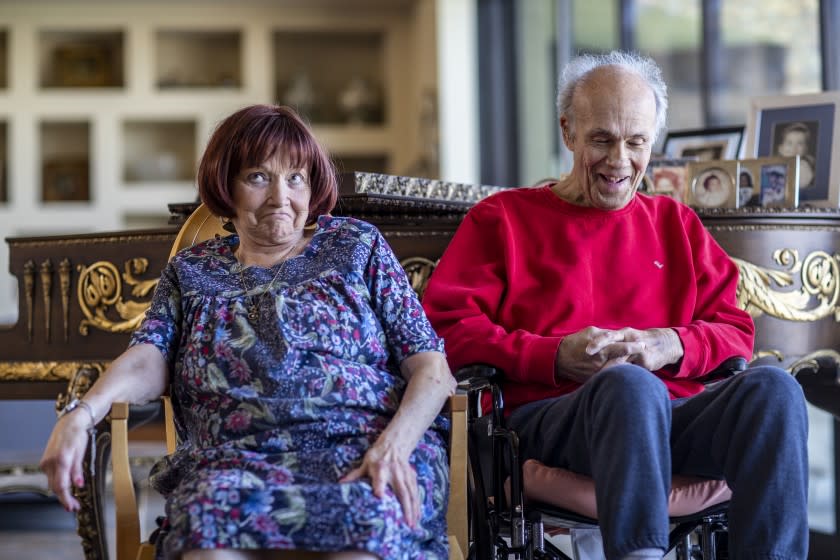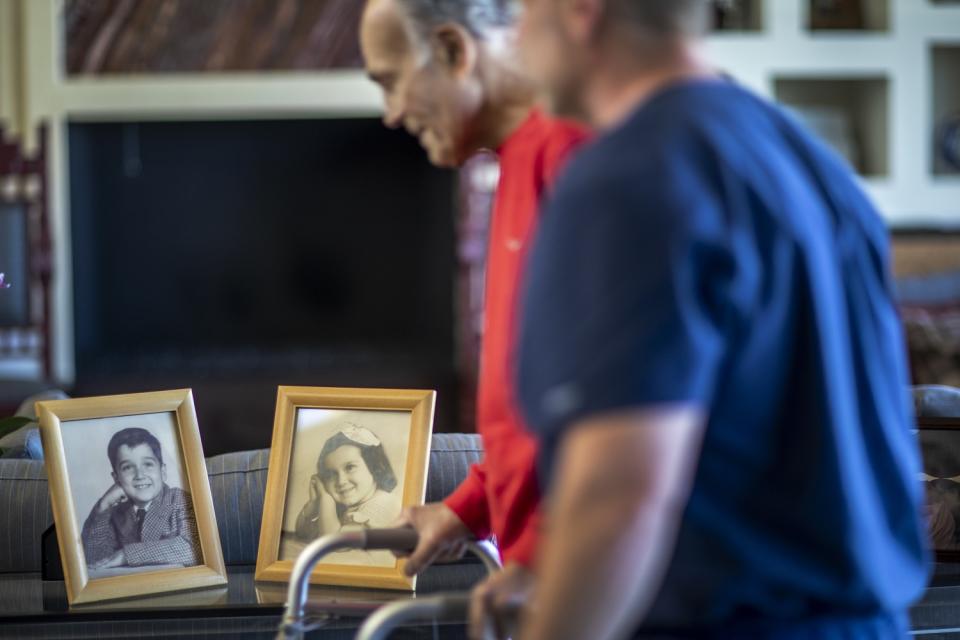'Angels without wings' helped save a couple in their 80s from COVID-19

Sandra Borns glances at her husband, her expression a mix of surprise and concern. His head is bowed. His eyes glisten. His forehead rests on a bony hand.
“We’ve been married for over 60 years,” she says. “I’ve never seen Bob cry.”
But on this Thursday morning in April, perched on a wheelchair in the living room he thought he would never see again, Bob Borns tears up over and over. It mostly happens when he talks about how grateful he is. For his long life. For his loving family. For the nurses who helped him and Sandra fight off death.
“Angels without wings,” he calls them, over and over again. When their shifts ended, they promised the man some dubbed “Papa” that they would see him in the morning, that he would get better. He was “shocked,” he says, “that anybody would give a damn so much. And work so hard.”
In the course of a week or so in early March, Bob and Sandra Borns and their middle daughter Betsy were infected with the virus that has swept the globe, killed hundreds of thousands of people, cost millions their jobs and confined millions more to their homes in an effort to bring the pandemic to an end.
Betsy Borns was lucky. She is 60, a television comedy writer. She had a mild case of COVID-19, virtually no symptoms, she said, and spent three weeks quarantined in a bedroom in her own home so she would not expose her immediate family to the disease, which has neither cure nor vaccine.

But Sandra is 83. Bob is 84. That makes them, according to early statistics from China, among the more vulnerable people on the planet.
The early total mortality rate for the disease is 1.5%, says Dr. Alan Williamson, chief medical officer at Eisenhower Health in Rancho Mirage, where the couple was hospitalized. For people over 60, that rises to 4%, he says. Over 70, it's about 8.5%.
“Then, if you’re over 80, it’s 13%,” he continues. “I wouldn’t say we expected them to die. But a 13% mortality rate is scary in medicine.”
Bob looks a little like his favorite actor in one of his favorite movies — Clint Eastwood, "Gran Torino." That is, if Eastwood had spent four weeks in a hospital room, interrupted by two stints in the intensive care unit. If he had dropped 20 pounds in short order and barely escaped being put on a ventilator.
If, like Bob, he assumed he was a goner.
“I thought I’d had it,” Bob says in a voice still raspy from disease and treatment. “I wanted to say goodbye to my children and grandchildren.”

'My chest was on fire'
It didn’t take long for the Bornses to realize that something had gone terribly wrong.
On March 4, they were en route home from a conference in Washington, D.C. The airport was bustling. The plane was packed, and Sandra couldn’t stop coughing.
“I tried very much to cover my mouth and everything, but I knew I was sick then,” she says. “My chest was on fire. … Bob had a sore throat, but I was really sick. And so they put me in the hospital first and had him at home in isolation.”
Sandra was admitted to Eisenhower Medical Center on March 9, a day before the hospital’s COVID-19 unit opened for business. She was whisked into a negative pressure room, the kind usually reserved for patients with tuberculosis, which keeps dirt, germs and viruses from escaping into the hospital at large.
She does not recall entering the hospital, or much about her 13 days there. But Bob cannot forget the day she was admitted.
“The media was portraying what the common thought was,” he says. “And they were saying, you know, if you’re in your 70s, you’re in trouble. Well, she’s 83. I’m 84. I was scared. I didn’t know what was going to come and what we were facing.”

Just days later, Bob’s own condition deteriorated, and their oldest daughter flew from Massachusetts to stay with him in Rancho Mirage. Stephanie Borns-Weil, a veterinarian, arrived on March 12. Because Bob was in isolation, they stayed in separate parts of the house and communicated via phone or by talking through the windows that overlook the Coachella Valley.
He got sicker and sicker.
Then on Friday the 13th, Bob walked into his bedroom, passed out and fell. Borns-Weil called his doctor. Because he was likely positive for the coronavirus, Bob didn’t want his daughter to drive him to the hospital and risk infecting her, too. It took another day to arrange for an ambulance.
“After the fall, while waiting for him to go to the hospital, I made sure to be outside the window when he got up from bed to move around the house so that if he should fall again, I would be there to help him,” said Borns-Weil, who is 61. “The house has loads of glass, so it was easy to follow him from his room to the kitchen or the front door, where I left his meals for him.”
Bob was admitted to Eisenhower on March 14. For eight days, husband and wife were hospitalized on the same floor, three rooms apart. They could not see each other. They spoke by phone. Sandra was discharged on March 22.
The Bornses celebrated their 62nd wedding anniversary at the end of March, separated by four miles and a global pandemic.
Sandra was home that day, recuperating in isolation. Their daughters delivered her anniversary card to the hospital, along with a bouquet of flowers, and hoped that both would reach their destination. Husband and wife spoke briefly via cell phone.
“I think we both felt fortunate,” Bob says. He pauses. Chokes up. “That we married each other.” Another pause. A big sigh. “I think we both know that you can do all the looking and thinking and choosing, but it’s a roll of the dice. Who the hell knows what’s going to happen?”
Sandra grins. Looks fondly at her husband.
“You may want to know what a love affair we had,” she says. “We had two children before we were married two years. And 18 years later, we had another child. … You can call it still in love, or not very careful.”
That final child is Emily Borns, 43, who was a professional chef in New York before moving to Rancho Mirage.
Sandra laughs and laughs. “I just want the public to know that he owes me an anniversary present.”
And what might that be?
She thinks for a moment. And knows that Bob has already paid up.
“Oh, having my husband home,” she says, “is the best gift I could ever have in the world.”
A turn for the worse

But it’s a gift Sandra almost did not receive.
When their March 30 anniversary dawned, the Bornses thought Bob would be back home any day, that they could celebrate their milestone together, if a bit later than usual.
COVID-19 had other ideas. Bob developed a blood clot in his lung, in what clinicians now realize is one of the virus’s deadliest side effects. He was wheeled back to the intensive care unit for his second stay there.
Heart specialists in China warned in March about an increased risk of blood clots in patients with COVID-19. On Wednesday, the American College of Cardiology published an FAQ for doctors about the impact of the novel virus on blood clots and bleeding, although it said that data “are quite limited.”
“With the disease running as rapidly through the world as this, it’s hard to get definitive information,” said Eisenhower’s Williamson. Particularly about “the effect the virus has on the blood clotting system. … A lot of the damage from the virus in the lungs is not the virus itself, but the little tiny blood clots.”
Four days after the Borns’ anniversary, as Betsy was driving to Rancho Mirage from Los Angeles County, she said, her father was doing fine. But right after she arrived at her parents’, the hospital called.
Bob had taken a turn for the worse. He was receiving the maximum level of oxygen possible. The next step was a ventilator.
He wanted to say goodbye.
Sandra and his two oldest daughters were in the living room, not far from the piano crowded with family photographs.
“At some point, I just, I felt I was losing it, and I don’t know why,” he recounts. “I’m Jewish, and I had what I call a come-to-Abraham-and-come-to-Moses session.”
“We told each other that we loved each other.”
Bob’s voice is thick with tears.
“We talked about how good life was. And I told them, ‘I think I’m done.’ And everybody started carrying on. I kept thinking, I’m going to heaven, going to have a chance to meet my parents and Sandra’s parents and our relatives going all the way back to Abraham.”
Sandra went to bed, but she couldn’t sleep. The phone rang the next morning.
“It’s Bob,” she says. “And he said, ‘Ya know, I feel better’.”
She laughs.
Six days later, her husband came home.

